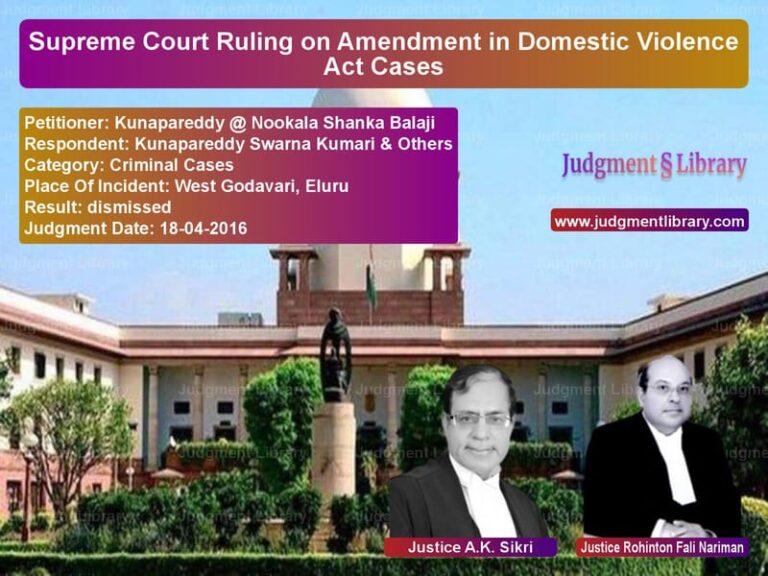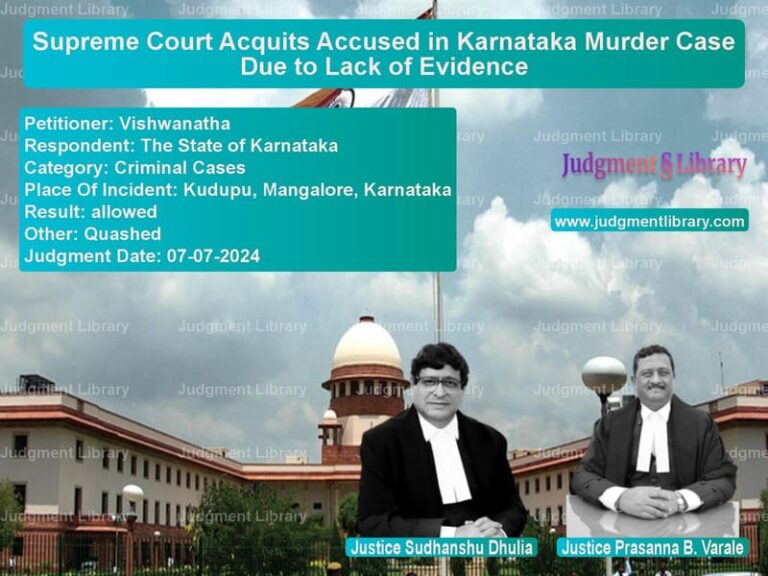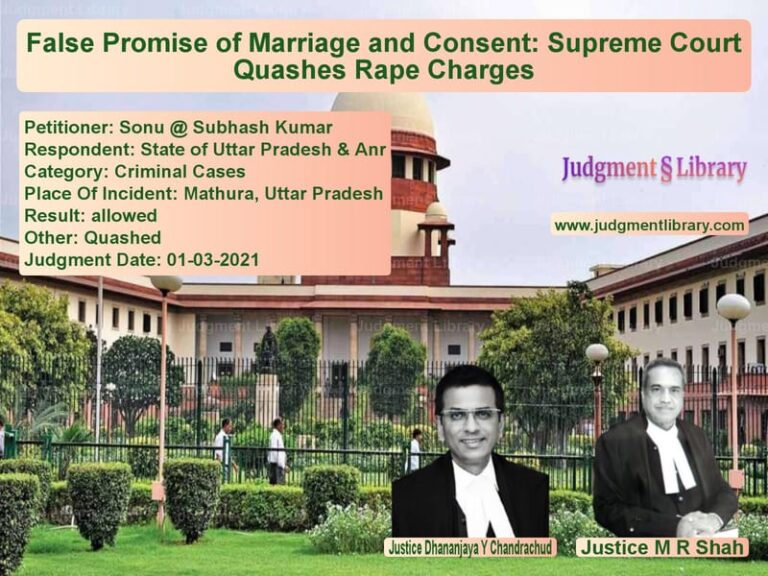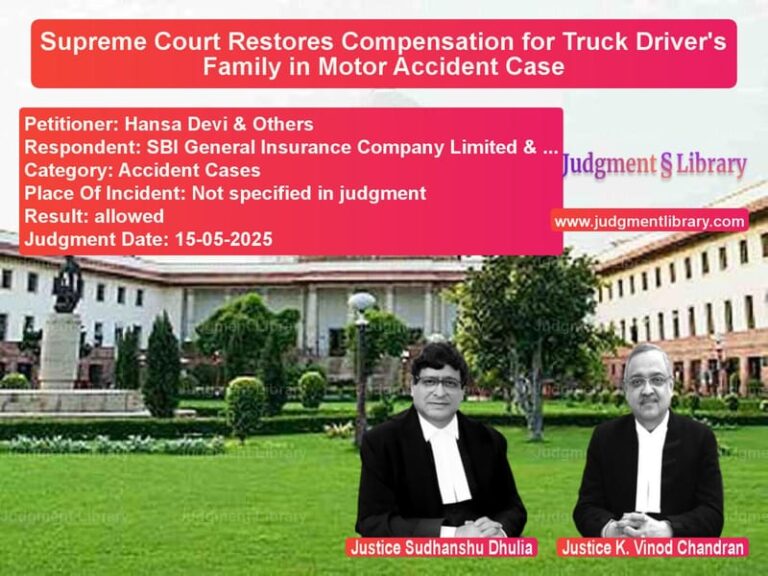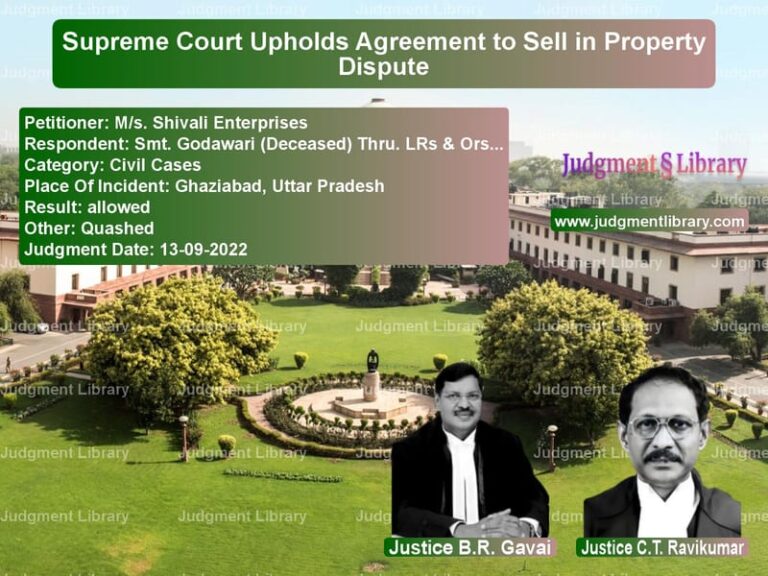POCSO Act and the Duty to Report: Legal Implications of Failing to Report Child Sexual Abuse
The case of The State of Maharashtra & Anr. vs. Dr. Maroti s/o Kashinath Pimpalkar presents an important legal precedent regarding the Protection of Children from Sexual Offences (POCSO) Act, 2012, and the legal obligation to report cases of child sexual abuse. The Supreme Court had to decide whether the quashing of an FIR against a doctor, who allegedly failed to report sexual offenses against minor tribal girls, was legally justified.
The Protection of Children from Sexual Offences (POCSO) Act, 2012, was enacted to ensure a robust legal framework to prevent and penalize sexual crimes against children. The Act mandates that anyone who becomes aware of such offenses must report them. Failure to do so is punishable under Section 21 of the Act. In this case, the accused doctor allegedly had knowledge of sexual abuse but did not report it, leading to charges against him under the POCSO Act. The Bombay High Court, however, quashed the FIR against him under Section 482 of the Criminal Procedure Code (CrPC), stating that there was no evidence to implicate him. The Supreme Court overturned this decision, reaffirming the duty of reporting such offenses and emphasizing that ignoring this responsibility defeats the very purpose of the POCSO Act.
Background of the Case
The case involved sexual offenses against minor tribal girls residing in a girls’ hostel in Chandrapur, Maharashtra. The FIR was registered under various sections of the IPC, POCSO Act, and SC/ST Act, including:
- Section 376AB of the Indian Penal Code (IPC) – Punishment for rape on a woman under 12 years of age.
- Sections 4 and 6 of the POCSO Act – Punishments for penetrative sexual assault and aggravated penetrative sexual assault.
- Sections 3(1)(w) and 3(2)(v) of the Scheduled Castes and Scheduled Tribes (Prevention of Atrocities) Act.
- Section 3 of the Maharashtra Prevention and Eradication of Human Sacrifice and other Inhuman, Evil, and Aghori Practices and Black Magic Act, 2013.
The chargesheet alleged that multiple minor girls were sexually assaulted. The accused doctor, who was responsible for their medical care, failed to report these crimes despite having knowledge of them.
Key Legal Questions
The case raised several legal questions:
- Does failure to report sexual abuse, despite knowledge of the offense, amount to criminal liability under the POCSO Act?
- Was the High Court justified in quashing the FIR under Section 482 CrPC?
- What are the broader implications of this ruling on mandatory reporting laws?
Key Arguments
Petitioner’s Argument
The State of Maharashtra argued that:
- The doctor had direct knowledge of the sexual offenses from the victims themselves but did not report them.
- The POCSO Act imposes a mandatory duty to report such crimes, and failure to do so should result in legal consequences.
- Medical professionals have an added duty to report child abuse cases under Indian law and international obligations.
- Failure to report allowed the crimes to continue and prevented justice for the victims.
Respondent’s Argument
The accused doctor contended that:
- There was no material evidence to prove that he had knowledge of the offenses.
- The medical examination confirming sexual abuse occurred at a later stage, and he was not informed of the nature of the crimes earlier.
- The High Court was correct in quashing the FIR as no prima facie case was made out against him.
Supreme Court’s Ruling
The Supreme Court reversed the High Court’s decision and reinstated the FIR against the doctor, stating:
“Failure to report sexual offenses against minor children is a serious crime, and those who shield offenders must also be held accountable.”
The Court emphasized that Section 19 of the POCSO Act imposes an unambiguous duty on individuals to report suspected cases of child sexual abuse. The Court further held:
“The POCSO Act was enacted to ensure the safety of children and their protection from sexual abuse. Its provisions must be enforced strictly to uphold the purpose of the legislation.”
The Supreme Court stressed that medical professionals, teachers, and caretakers have an increased responsibility to report such offenses. It clarified that Section 21 of the POCSO Act, which prescribes punishment for failure to report, is not a mere procedural obligation but a substantive legal requirement.
Read also: https://judgmentlibrary.com/supreme-court-restores-conviction-in-jharkhand-rape-and-murder-case/
Analysis of the Judgment
The ruling has several important implications:
- Strengthening Mandatory Reporting: This case reaffirms that failing to report known sexual offenses is itself a punishable crime.
- Legal Accountability for Professionals: Doctors, teachers, and other responsible individuals are held to a higher standard due to their proximity to victims.
- Rejection of High Court’s Quashing of FIR: The Supreme Court’s decision ensures that cases of child abuse are not dismissed prematurely.
- International Commitments: India’s obligations under the UN Convention on the Rights of the Child require strict enforcement of child protection laws.
Conclusion
The Supreme Court’s decision in this case is a landmark judgment reinforcing the importance of the POCSO Act and its mandatory reporting obligations. It clarifies that those in positions of responsibility, such as doctors and caretakers, have a legal duty to report such crimes and will face legal consequences for failing to do so.
By holding the accused accountable, the judgment sends a strong message that shielding offenders or ignoring instances of abuse is itself a criminal act. This ruling will likely impact future cases where individuals fail to report known sexual offenses against children, ensuring that such crimes do not go unpunished.
Petitioner Name: The State of Maharashtra & Anr..Respondent Name: Dr. Maroti s/o Kashinath Pimpalkar.Judgment By: Justice Ajay Rastogi, Justice C.T. Ravikumar.Place Of Incident: Chandrapur, Maharashtra.Judgment Date: 01-11-2022.
Don’t miss out on the full details! Download the complete judgment in PDF format below and gain valuable insights instantly!
Download Judgment: the-state-of-maharas-vs-dr.-maroti-so-kashi-supreme-court-of-india-judgment-dated-01-11-2022.pdf
Directly Download Judgment: Directly download this Judgment
See all petitions in SC/ST Act Case
See all petitions in Legal Malpractice
See all petitions in Contempt Of Court cases
See all petitions in Judgment by Ajay Rastogi
See all petitions in Judgment by C.T. Ravikumar
See all petitions in allowed
See all petitions in supreme court of India judgments November 2022
See all petitions in 2022 judgments
See all posts in Criminal Cases Category
See all allowed petitions in Criminal Cases Category
See all Dismissed petitions in Criminal Cases Category
See all partially allowed petitions in Criminal Cases Category


